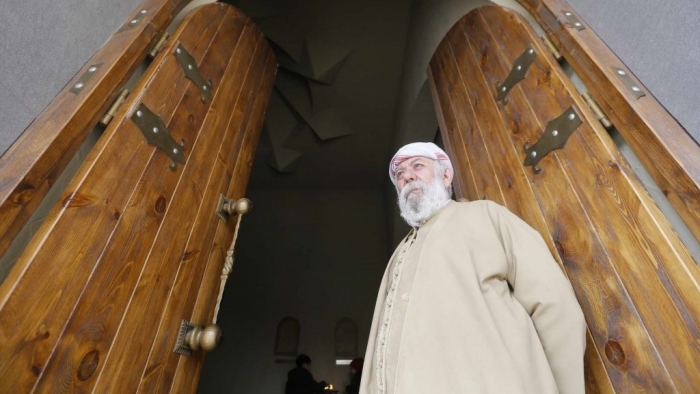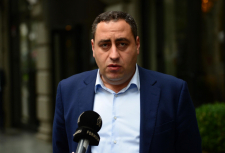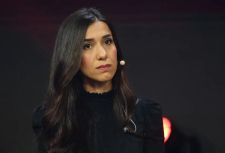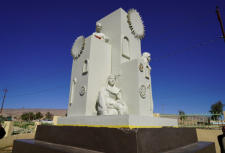It is necessary to help preserve the cultural identity of the unique community of Yazidis of Georgia

The uniqueness of the Yezidis community of Georgia is that on the one hand 90% of the residents of a large city and the capital of the country – Tbilisi, live in this city for several generations, but managed to become worthy citizens of Georgia and not assimilate, preserve national identity and culture. At the same time, Yazidis are integrated into Georgian society.
Fundamentally, the problem of maintaining the identity of communities living in urban environments is different from similar tasks in relation to rural communities. For example, the Yazidis of the Republic of Armenia often live in almost "purely Yazidi" villages. Children communicate with their peers in their native language, the rural community celebrates holidays together, preserves national cultural traditions. It's natural for it.
In fact, the preservation of cultural identity is primarily associated with the solution of socio-economic problems of the village. If people have jobs or conditions for the development of traditional economy, and the village has a social infrastructure – the community is much easier to maintain identity than in a large metropolis.
In General, it is a miracle that for such a long period of life in Tbilisi Yazidis have not assimilated, but preserved the language, customs, self-awareness of tradition – before the Soviet era, and the hard times of the 90s of the last century.
At the same time, initially settled in Tbilisi, Yazidis inhabited the streets of the city just as they lived in their homeland, that is, villagers tried to settle in the same area and maintained communication in the usual environment.
Representatives of one tribe or bar (tribal union) Yazidis tried to settle on the same street. In Tbilisi settled such Yezidi tribes and bars like Rashi, chokhrashi, uti, isadezi, mamrashi, mandecki, mandasori, korkiti, baravi, balaqari, hani, ankosi, mosaki, kashahi, bainduri, korblakhi, pivazi, sipki, boti, gasani, rojki. Moreover, the representatives of the bars mandecki baravi and settled in the present area of the Saarbrucken square and at the former "Peskakh". Representatives of the bar of the rashi and uti settled on the streets adjacent to Rustaveli Avenue and Marjanishvili square, chokhrashi — district street Ninoshvili, korkiti — on the Griboyedov streets, etc.. Such resettlement helped Tbilisi Yazidis to preserve the culture and language, but also contributed to mutual assistance within the community.
Another factor that has long contributed to the cohesion of Yazidis is the spread of certain urban professions among them.
We should not forget that when the Yazidis massively settled in Tbilisi, there was no special "industrial boom" here and it was not easy to find a job.
Initially, the Yazidis along with the Georgians from Racha tried to become a master of the profession of handyman-porter, which in Tbilisi was usually called "musha”. These were the carriers of heavy loads, performing heavy work where strength and endurance were needed.
Nothing "unprestige" was in the profession of Musha (worker) – people honestly earned money by their labor. The same Georgians from Racha among other Georgians enjoyed and enjoy great respect. Moreover if over the honest Racha-man other Georgians make kind of fun (there's even a series of anecdotes about people from Racha) – but this never happened toward Yazidis. It speaks, first of all, about surprising "correctness" of the Georgian people which most of all was afraid even involuntarily to offend the person of other nationality.
But if the specialization of "Musha" in the end chose a small part of the Yazidis, the other area of employment, which initially decided to "try the forces" of Yazidis Tbilisi, was assigned to them for many decades.
We are talking about the improvement of the city, maintaining cleanliness and order. There was even a Tbilisi sign – if on some street or in some yard it is not very cozy – so it was cleaned and landscaped not by Yazidis, but by other residents of the city. They usually did not manage to maintain order as well as the Yazidis.
In fact, the flavor of old Tbilisi, with its cozy streets and courtyards is impossible to imagine without the daily work of the Yazidis, who created a unique mountain atmosphere, with love of the city, which became their native.
Time passed – and in the sphere of municipal improvement included Georgians, especially after the mayor's office of Tbilisi raised wages to workers in this area. So "maintaining order in the city" has long ceased to be a Yazidi "monopoly" and has become a very desirable job for Georgians. But for a long time, Yazidis find application in other spheres and professions, among them there are doctors, workers of culture and art, athletes.
Thus, the problem of economic and social adaptation of the Yazidis of Tbilisi is not in principle – as hard-working and talented people economically, they are mostly quite successful. But the problem of loss of cultural identity is becoming more acute for quite objective reasons.
With the growth of Tbilisi, the reconstruction of its historical center is a thing of the past and the "compact" settlement of certain streets and districts of the city by Yazidis. On the one hand it is sometimes good – people moved into new comfortable apartments in urban areas.
But on the other hand, more and more Yazidis live entirely in the Georgian language and cultural environment, both "at the place of residence" and at work. Many of the Yazidis, outside the family don’t practice their language as their neighbors-Georgians don't know language of the Yazidis.
Also, unfortunately, the number of the Yazidi community in Georgia and Tbilisi decreased compared to the times before the collapse of the USSR. If in 1989 Yazidis lived in Georgia about 33 thousand, now according to the last census there are 12 thousand.
The main reason – mass migration is especially socially disadvantaged 90-ies of the last century. In recent years, again due to life in a large metropolis, the process of assimilation has begun.
If earlier Yazidis married exclusively within their community, now increasingly enter into mixed marriages (usually with Georgians). The reason is the same – fewer Yazidis grow up and communicate in their "cultural" environment. And the children of such marriages identify themselves more with the Georgians, not with Yazidis.
Of course, all these are objective processes. But Yazidis as they can, keep their language, their unique culture, in Tbilisi there is a Yazid temple. The fact that such a small community was able to self-organize and retain its identity should not only be welcomed, but also in every way to help these people.
A small community of 12,000 people is simply unable to maintain all the infrastructure that would contribute to the preservation of linguistic and cultural identity in the modern hyper information society, and even in the capital city. They need help from the state. In particular the state television of Georgia along with the broadcasts in the languages of national minorities such as the Azerbaijanis and Armenians just need the transmission and broadcasting in the language of the Yazidis.
Also, the issue of school education in the language of Yazidis is acute. At the Yazidi temple Tbilisi "Ziarat yazidi" there is a "Sunday school" – but it is not enough. They need a full-fledged Yazidi school where children would study in their native language environment. With textbooks, qualified teachers, professionally designed curriculum. All this is a difficult matter – but it is necessary to start saving the identity of the Yazidis of Tbilisi now.
Tags:
It is necessary to help preserve the cultural identity of the unique community of Yazidis of Georgia

The uniqueness of the Yezidis community of Georgia is that on the one hand 90% of the residents of a large city and the capital of the country – Tbilisi, live in this city for several generations, but managed to become worthy citizens of Georgia and not assimilate, preserve national identity and culture. At the same time, Yazidis are integrated into Georgian society.
Fundamentally, the problem of maintaining the identity of communities living in urban environments is different from similar tasks in relation to rural communities. For example, the Yazidis of the Republic of Armenia often live in almost "purely Yazidi" villages. Children communicate with their peers in their native language, the rural community celebrates holidays together, preserves national cultural traditions. It's natural for it.
In fact, the preservation of cultural identity is primarily associated with the solution of socio-economic problems of the village. If people have jobs or conditions for the development of traditional economy, and the village has a social infrastructure – the community is much easier to maintain identity than in a large metropolis.
In General, it is a miracle that for such a long period of life in Tbilisi Yazidis have not assimilated, but preserved the language, customs, self-awareness of tradition – before the Soviet era, and the hard times of the 90s of the last century.
At the same time, initially settled in Tbilisi, Yazidis inhabited the streets of the city just as they lived in their homeland, that is, villagers tried to settle in the same area and maintained communication in the usual environment.
Representatives of one tribe or bar (tribal union) Yazidis tried to settle on the same street. In Tbilisi settled such Yezidi tribes and bars like Rashi, chokhrashi, uti, isadezi, mamrashi, mandecki, mandasori, korkiti, baravi, balaqari, hani, ankosi, mosaki, kashahi, bainduri, korblakhi, pivazi, sipki, boti, gasani, rojki. Moreover, the representatives of the bars mandecki baravi and settled in the present area of the Saarbrucken square and at the former "Peskakh". Representatives of the bar of the rashi and uti settled on the streets adjacent to Rustaveli Avenue and Marjanishvili square, chokhrashi — district street Ninoshvili, korkiti — on the Griboyedov streets, etc.. Such resettlement helped Tbilisi Yazidis to preserve the culture and language, but also contributed to mutual assistance within the community.
Another factor that has long contributed to the cohesion of Yazidis is the spread of certain urban professions among them.
We should not forget that when the Yazidis massively settled in Tbilisi, there was no special "industrial boom" here and it was not easy to find a job.
Initially, the Yazidis along with the Georgians from Racha tried to become a master of the profession of handyman-porter, which in Tbilisi was usually called "musha”. These were the carriers of heavy loads, performing heavy work where strength and endurance were needed.
Nothing "unprestige" was in the profession of Musha (worker) – people honestly earned money by their labor. The same Georgians from Racha among other Georgians enjoyed and enjoy great respect. Moreover if over the honest Racha-man other Georgians make kind of fun (there's even a series of anecdotes about people from Racha) – but this never happened toward Yazidis. It speaks, first of all, about surprising "correctness" of the Georgian people which most of all was afraid even involuntarily to offend the person of other nationality.
But if the specialization of "Musha" in the end chose a small part of the Yazidis, the other area of employment, which initially decided to "try the forces" of Yazidis Tbilisi, was assigned to them for many decades.
We are talking about the improvement of the city, maintaining cleanliness and order. There was even a Tbilisi sign – if on some street or in some yard it is not very cozy – so it was cleaned and landscaped not by Yazidis, but by other residents of the city. They usually did not manage to maintain order as well as the Yazidis.
In fact, the flavor of old Tbilisi, with its cozy streets and courtyards is impossible to imagine without the daily work of the Yazidis, who created a unique mountain atmosphere, with love of the city, which became their native.
Time passed – and in the sphere of municipal improvement included Georgians, especially after the mayor's office of Tbilisi raised wages to workers in this area. So "maintaining order in the city" has long ceased to be a Yazidi "monopoly" and has become a very desirable job for Georgians. But for a long time, Yazidis find application in other spheres and professions, among them there are doctors, workers of culture and art, athletes.
Thus, the problem of economic and social adaptation of the Yazidis of Tbilisi is not in principle – as hard-working and talented people economically, they are mostly quite successful. But the problem of loss of cultural identity is becoming more acute for quite objective reasons.
With the growth of Tbilisi, the reconstruction of its historical center is a thing of the past and the "compact" settlement of certain streets and districts of the city by Yazidis. On the one hand it is sometimes good – people moved into new comfortable apartments in urban areas.
But on the other hand, more and more Yazidis live entirely in the Georgian language and cultural environment, both "at the place of residence" and at work. Many of the Yazidis, outside the family don’t practice their language as their neighbors-Georgians don't know language of the Yazidis.
Also, unfortunately, the number of the Yazidi community in Georgia and Tbilisi decreased compared to the times before the collapse of the USSR. If in 1989 Yazidis lived in Georgia about 33 thousand, now according to the last census there are 12 thousand.
The main reason – mass migration is especially socially disadvantaged 90-ies of the last century. In recent years, again due to life in a large metropolis, the process of assimilation has begun.
If earlier Yazidis married exclusively within their community, now increasingly enter into mixed marriages (usually with Georgians). The reason is the same – fewer Yazidis grow up and communicate in their "cultural" environment. And the children of such marriages identify themselves more with the Georgians, not with Yazidis.
Of course, all these are objective processes. But Yazidis as they can, keep their language, their unique culture, in Tbilisi there is a Yazid temple. The fact that such a small community was able to self-organize and retain its identity should not only be welcomed, but also in every way to help these people.
A small community of 12,000 people is simply unable to maintain all the infrastructure that would contribute to the preservation of linguistic and cultural identity in the modern hyper information society, and even in the capital city. They need help from the state. In particular the state television of Georgia along with the broadcasts in the languages of national minorities such as the Azerbaijanis and Armenians just need the transmission and broadcasting in the language of the Yazidis.
Also, the issue of school education in the language of Yazidis is acute. At the Yazidi temple Tbilisi "Ziarat yazidi" there is a "Sunday school" – but it is not enough. They need a full-fledged Yazidi school where children would study in their native language environment. With textbooks, qualified teachers, professionally designed curriculum. All this is a difficult matter – but it is necessary to start saving the identity of the Yazidis of Tbilisi now.
Tags:


























